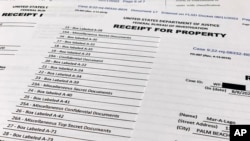A federal judge in Florida ordered the Department of Justice to propose redactions to the affidavit that justified the warrant used last week to search former President Donald Trump’s Florida estate.
Federal Magistrate Judge Bruce Reinhart in West Palm Beach said he would decide next Thursday on whether to unseal the redacted version. He gave the Justice Department a week to make its determination about which parts must be redacted.
The department is opposed to making the affidavit public because it details the evidence that prompted the FBI search at Trump’s Mar-a-Lago estate and could compromise its ongoing investigation into whether Trump kept and mishandled classified and sensitive government records.
“I’m not prepared to find that the affidavit should be fully sealed,” Reinhart said. “There are portions of this affidavit that can be unsealed.”
The judge has already unsealed the warrant itself and two other documents at the department’s request.
Thursday’s hearing was prompted by major American media outlets seeking to make public the affidavit and other records tied to the search. Lawyers representing CNN, The New York Times, The Washington Post, and others met with Reinhart Thursday to argue for the release of the sealed affidavit and other documents.
During the controversial search of Trump’s resort on August 8, FBI agents took 11 sets of classified government documents that the former president had taken to his residence, after leaving the White House in January 2021.
Trump and his allies have denounced the search as a “weaponization” of law enforcement, with congressional Republicans threatening to investigate the Justice Department and the FBI when they take control of Congress.
Amid the uproar, several media outlets last week asked Reinhart to unseal all documents related to the search, including the search warrant and the underlying affidavit. Other outlets joined the motion later.
Reinhart unsealed the search warrant last Friday after the Justice Department requested its release. But the department says it doesn’t want the affidavit made public, arguing that it contains “highly sensitive information” about witnesses and other “information required by law to be kept under seal.”
The partially redacted search warrant revealed the Justice Department is investigating Trump for a potential violation of the Espionage Act and other criminal violations in connection with his handling of highly classified documents. The affidavit contains additional details about the DOJ investigation.
"If disclosed, the affidavit would serve as a roadmap to the government's ongoing investigation, providing specific details about its direction and likely course, in a manner that is highly likely to compromise future investigative steps,” federal prosecutors wrote in a Monday filing.
Trump has denied any wrongdoing. Decrying the search as an “unAmerican, unwarranted, and unnecessary raid,” the former president wrote on his social media platform that he wants the documents released immediately.
In their court filing, the media companies argued it is in the public interest to see “the government’s basis for the extraordinary step of seeking the warrant to search a former president’s home.”
The filing said that if the judge reviews the document and finds a compelling interest in keeping some portions of the information secret, then the remainder should be made public.
Those arguing for the document’s release include The Associated Press, broadcast networks ABC, CBS, NBC and CNN, as well as newspaper companies The New York Times, The Washington Post, Dow Jones & Company, E.W. Scripps Company and McClatchy.
In the days since the media outlets first filed a request to unseal the documents, others have joined the motion.
In a filing late Wednesday, the Florida Center for Government Accountability argued the “public importance of the case” favors unsealing the document.
Another person pushing for the affidavit’s release is Andy Martin, a New Hampshire U.S. Senate candidate and writer who is requesting access to the document as part of his research on a book titled “A Psychological Study of President Donald Trump.”




